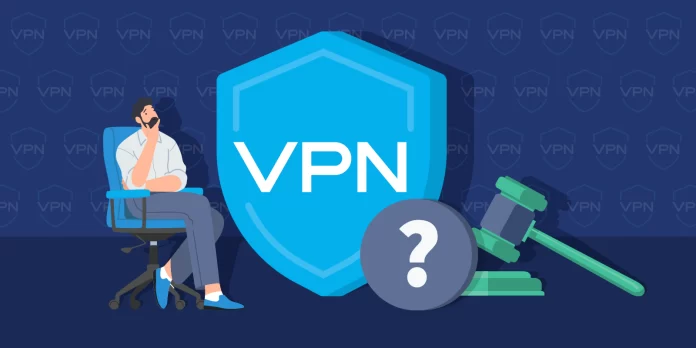This is a very simple question to answer. Let us look at each aspect of it in detail:
The question, “Is it legal to use VPN?” is asked in popular search engines an infinite number of times. In most cases, users want to know whether it’s possible to use a particular VPN software in their country or prevent their Internet Service Providers from tracking their web activity or torrenting/p2p transactions. The answer is yes, it is legal to use VPN, but if your state has banned it, then it will be risky to use it in your area. There are a few countries, like Russia, China, Japan, etc., that have restrictions on VPNs.
How Do You Know Whether Use of VPN is Legal or Not?
If it is not Directly Prohibited by Law
If using a VPN is not explicitly banned by legislation in your state, you may be confident that it is lawful to do so. However, there are a few nations were using a VPN is expressly prohibited, so you should first confirm this with the local government.
Even though it’s just as easy as viewing geo-restricted content or visiting companies that aren’t accessible, utilizing a VPN for unlawful purposes could be a problem. However, this does not imply that all Internet providers are ineffective; in fact, several provide free trials so that you can evaluate them before making a long-term commitment (for example).
We suggest joining up paid services if you’re thinking about flying overseas and want to view news websites from across the world while you’re away (or maybe you just want to save money), as they offer servers all throughout Asia, such as Shanghai And Beijing.
Be Ready To Pay Fines If Some Actions Are Restricted By The Government
It’s critical to understand that some activities are prohibited by law when utilizing a VPN. If you use a VPN or download services, you can be breaching the law in some states. For instance, Florida has signed a bill making it unlawful to use VPNs and some other P2P file-sharing programs in order to prevent the unauthorized sharing of pirated content over these networks.
There are regulations prohibiting the online sale of individual data along with this limitation on specific software and services (such as through ads posted on Facebook). California Penal Code 17502(a)(1), which states: “A woman who willingly procures false information, particularly regarding his selfhood in correlation with either matter but under the title will be punished by confinement in accordance with suburb (h) of Section 1170,” if used improperly by a business with any purpose here towards illegal activity, they could be fined heavily to $500k per violation.
Confirm That Your VPN Provider Has No Ties With Copyright Holders
It’s crucial to make sure that your VPN provider has no connections to aggressive rights holders, even though you can use a VPN to shield yourself from these people. This is particularly valid if you’re searching for a free or inexpensive option.
● Examining their service agreements is the best way to confirm that your VPN firm is not associated with any generally pro organizations (TOS). Make sure they don’t retain logs of users’ activity or otherwise monitor them, and keep an eye out for any other clues that would point to the reality of these claims.
● Does the business have a location in the United States, where the majority of its clients reside? If so, does it provide information to other nations upon request?
A Couple Of States Impose Restrictions But Do Not Prosecute Residents For Using VPNs
You should be careful to avoid using VPNs if you reside in a jurisdiction where doing so is prohibited. Many nations have regulations that forbid their residents from using websites or services that are located in other nations. For instance, VPN access to websites maintained on local servers far outside China and Iran is not permitted for its citizens. Using any kind of proxy server software to upload videos hosted on servers located or outside Russia, Syria, or Turkey is likewise prohibited.
That if anyone needs this sort of service, users would have no choice but to break their administration’s rules and regulations; however, if they do not desire anything bad to happen, they just shouldn’t start thinking about busting them anymore! In some cases, however (such as Guangdong), there are exemptions for students who do need access during class hours but not following hours.
Be Sure Your Online Activities are on Track
● You might be shocked to learn that VPNs are prohibited in a few specific situations. Using a VPN is entirely legal and does not violate any laws in the majority of nations, notably Australia and the Uk.
● Keep in mind that most states do not have laws against VPNs (with one exception). This means that utilizing a free trial of a VPN if you’re not based in the United Kingdom or Canada, or possibly even if a third party uses them on their name, won’t violate any laws. What you need to do is purchase a VPN service and stay on track, as if you break your state rules, you will be able to pay a fine or bear the punishment. Keep all activities crystal clear for any worse conditions if it is banned in your location, but you purchased them for study purposes, for example.
● So, before building up your connection, it’s crucial to be aware of the regulations in each nation, especially if you intend to use your VPN while traveling (or even simply at home).
Conclusion
Is using a VPN legal? The reply is unambiguous, yes. However, it’s crucial to keep in mind that utilizing a VPN may result in you acting illegally in some nations. Before engaging in this kind of action, check with an expert lawyer or a local media organization if you are unsure about the laws in your country.


